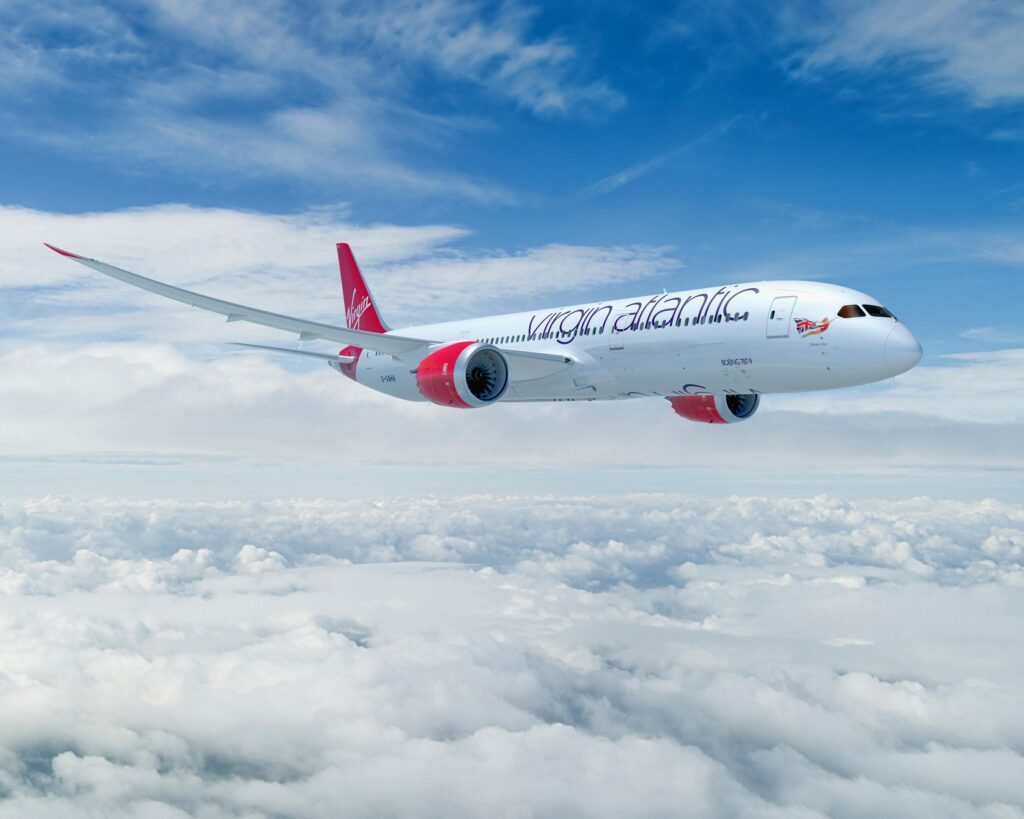
Features
Aircraft
Airlines
Fuel
World’s first 100% sustainable aviation fuel flight crosses the Atlantic
December 1, 2023 By Wings Staff
 Photo Credit: Virgin Atlantic
Photo Credit: Virgin Atlantic In what’s being called a world first, a Virgin Atlantic Boeing 787 commercial airliner flew from London to New York on 100 per cent sustainable aviation fuel (SAF) on a non-commercial flight.
The cross-Atlantic flight, carried out on Nov. 28 and operated as Flight100, was powered without using fossil fuels, relying on what Virgin officials called a “unique dual blend” SAF: 88 per cent HEFA (Hydroprocessed Esters and Fatty Acids) supplied by AirBP and 12 per cent SAK (Synthetic Aromatic Kerosene) supplied by Virent, a subsidiary of Marathon Petroleum Corporation. The HEFA is made from waste fats while the SAK is made from plant sugars, with the remainder of plant proteins, oil and fibres continuing into the food chain. “SAK is needed in 100 per cent SAF blends to give the fuel the required aromatics for engine function,” Virgin officials said.
While other technologies such as electric and hydrogen remain decades away, Virgin Atlantic said, SAF can be used now. “Today, SAF represents less than 0.1 per cen% of global jet fuel volumes and fuel standards allow for just a 50 per cent SAF blend in commercial jet engines,” they said. “Flight100 will prove that the challenge of scaling up production is one of policy and investment, and industry and government must move quickly to create a thriving UK SAF industry.”
“The world will always assume something can’t be done, until you do it,” said Virgin Atlantic founder Richard Branson, who was aboard the flight with others including corporate and government officials, engineers, and journalists.
As well as proving the capabilities of SAF, the flight will assess how its use affects the flight’s non-carbon emissions with the support of consortium partners ICF, Rocky Mountain Institute (RMI), Imperial College London and University of Sheffield. The research will improve scientific understanding of the effects of SAF on contrails and particulates and help to implement contrail forecasts in the flight planning process Virgin officials said. “Data and research will be shared with industry, and Virgin Atlantic will continue its involvement with contrail work through RMI’s Climate Impact Task Force, which is part-funded by Virgin Unite,” they said.
While this is the first jetliner to make the trans-Atlantic journey using only the sustainable fuel, it was not a commercial flight and not the first jet to do so – Gulfstream Aerospace made the Atlantic crossing earlier this month with a business jet powered only by the eco-fuel. And in 2021, Air France-KLM flew from Paris to Montreal using a mix of petroleum-based jet fuel and a synthetic derived from waste cooking oils.